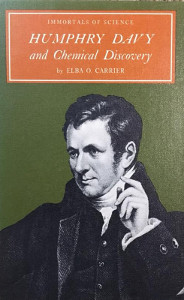Humphry Davy and Chemical Discovery

Author:
Elba O. Carrier
Publication:
1965 by Franklin Watts, Inc
Genre:
Biography, Non-fiction, Science
Series:
Immortals of Science ![]() Members Only (World History)
Members Only (World History)
Pages:
161
Current state:
This book has been evaluated and information added. It has not been read and content considerations may not be complete.
Book Guide
Search for this book used on:
SIR HUMPHRY DAVY (1778-1829) did much to advance the great tradition of English chemistry. Inspired by Antoine Lavoisier's brilliant work in France, Davy experimented with gases and discovered the exhilarating effect and anesthetic qualities of "laughing gas" (nitrous oxide). His investigations also included the decomposition of alkalies by electricity, and the preparation of sodium, potassium, and calcium by electrolysis. Davy also identified the element chlorine; did research on iodine and the rare earths; and identified the diamond as carbon. In 1812, he hired Michael Faraday as his assistant—called by some Davy's "greatest discovery." Davy further invented the electric arc and the miner's safety lamp, and became President of the Royal Society in 1820. In this simply written biography, Dr. Elba O. Carrier brings this great English chemist alive for modern readers.
From the book
To view an example page please sign in.
Content Guide
Please sign in to access all of the topics associated with this book and view other books with the same topics.
Please sign in to access the locations this book takes place in and view other books in the same location.
Please sign in to access the time periods this book takes place in and view other books in the same time period.
For information about the lead characters please sign in.
Reviews

The Immortals of Science Series
Reviewed by Sara Masarik
These books are of varying lengths based on how much is known about the lives of the subject. Whatever the length, I sped through each one as though it were a suspense novel. How will this one manage to carry on his work in the midst of civil war? How can that one earn the respect of the scientific community so his work can be published for the world? What will be the exciting sequence of events that will lead to the ultimate breakthrough? Will he live long enough to find the answer he has searched for all his life?
The science in these books is written in language any curious reader will be able to understand. The authors don’t condescend, but the writing is not above a confident reader, perhaps ten and above. They would also be interesting enough for reading aloud so they can be shared with the entire family, whatever their ages.
Find This Book
Search for this book used on:


